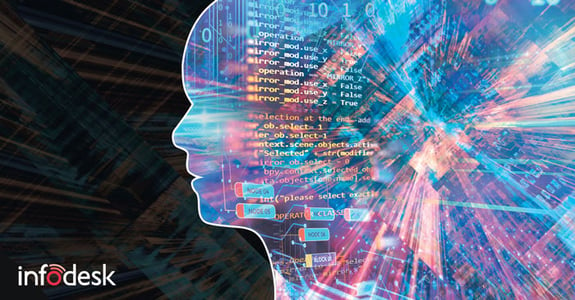Part 2 of the Future of Intelligence series
In Part 1, we discussed human, artificial and augmented intelligence to decipher and compare the strengths of each. In the second part below, we talk about the potential impacts of these three types of cognition on the Information Management industry.
.
What do these new technologies mean for Information Management?
Within the Information Management industry, it is becoming increasingly obvious that there is an AI ‘space-race’ brewing. And just like the superpowers of the 1960s, we’re likely to spend an enormous amount of time and money on being the first to reach the lofty goals – only to find that the infrastructure or technology necessary to make the most of it doesn’t exist.
In our last blog, we highlighted where the machine and where the human shines. AI hasn’t reached a level where it can perfectly replace natural cognition or expertize, so why not use it in conjunction with its human counterpart to achieve the best result? This is by no means to the detriment of AI, it’s merely utilizing these new technologies in the most effective way. Rather than racing to replace something that is still the most effective method of achieving tasks – let’s work to supplement it and augment the capability.
But how does this look in reality, and what does this actually mean for the industry? To identify the benefits of intelligence augmentation, let’s look at a concept we’re all familiar with, information overload. This isn’t a new problem; the abundance of today’s information results in critical insights being missed, resources being underused and productivity plummeting across our workflow. However, this is going to get worse before it gets better. The International Data Corporation (IDC) predicts that “the collective sum of the world’s data will grow from 33 zettabytes this year to 175 zettabytes by 2025.” To put this into context, a zettabyte is one trillion gigabytes… now multiply that 175 times! If we’re struggling with the amount of information available now, how are we going to meet future challenges? The answer, intelligence augmentation.
We now know the respective strengths and weaknesses of AI and humans, so let’s address the problem of information overload with each in isolation:
AI vs. Information Overload:
Artificial intelligence is extremely adept at dealing with the quantity of data associated with information overload. Its ability to quickly and accurately filter and analyze vast quantities of information means it can help stems the data tides.
But it doesn’t have the capacity to understand the information that it has identified as relevant so that it can provide tractable and relevant insights to organizations based on their goals, strategy, and culture.
Humans vs. Information Overload:
Leveraging human curation and expertize is the best way to process and draw insights from information that is complex, or relevant to complex environments, such as an organization. Yet it is not capable of keeping on top of the amount of information that is produced across the ‘dataverse’.
Humans and AI (aka Augmented Intelligence) vs Information Overload:
Utilizing the power of AI, information that is most important to an organization can be discovered, enriched and delivered to the expert curators who need it most.
These experts can then take the information, draw insights and actions from it that align with the organization’s goals and strategy, and ensure these are achieving precisely what the business requires to move forward.
This is very much a simplified interpretation of both information overload and augmented intelligence, yet it serves to highlight how beneficial the pairing of human and AI capabilities really is when used in a way that plays to the strengths of both. It is also one of many examples of how the pairing of the best in AI and human capability can achieve better results across the whole industry.
AI is nowhere near the capability or comprehension of the experts that organizations use on a daily basis to improve their knowledge, drive their strategy and ultimately, grow. To suggest otherwise is to exaggerate its current ability and belittle the mastery of these individuals. Both, however, have their strengths – so why not play to them?
.
Won’t AI eventually replace intelligence regardless?
Perhaps, but coming back to the space-race analogy, why shoot for the moon only to find there’s nothing to do when you get there? We are better off using the technology we have now to improve upon our existing capabilities.
.

COMMENTS